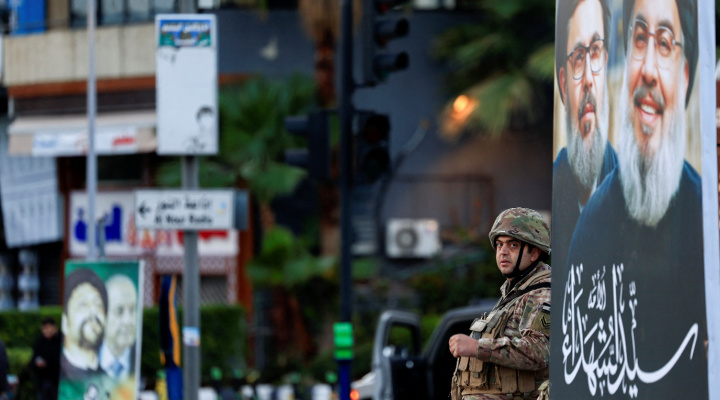Soldier stands guard next to poster with images of late Hezbollah leader Sayyed Hassan Nasrallah and late senior Hezbollah official Hashem Safieddine, at the entrance of Beirut’s southern suburbs in Lebanon, after a ceasefire between Israel and Iran-backed group Hezbollah took effect on Nov. 27, 2024. Photo: REUTERS/Thaier Al-Sudani
The United Nations Interim Force in Lebanon (UNIFIL) stretches the meaning of the word “interim.” Deployed in 1978 as a peacekeeping force, its “temporary” mandate has persisted for 47 years.
During this period, three major wars have erupted between Israel and militias in Lebanon, and UNIFIL has failed to pre-empt, prevent, or resolve any of them. Costing $500 million annually, UNIFIL is an ineffective expenditure. When the UN convenes to renew its mandate in August, it should disband the force permanently.
Without UNIFIL, Lebanon’s government would be compelled to take responsibility for its sovereignty. In 2006, UNIFIL’s mandate was expanded from 2,000 to 15,000 troops, with the expectation that the increased personnel and firepower would support the Lebanese Armed Forces (LAF) in deploying south of the Litani River and keeping the area free of Hezbollah and its weapons.
However, UNIFIL peaked at 10,000 troops and remained as ineffective as before. Since its inception, UNIFIL has not engaged outlaw forces in any firefights or law enforcement actions. Instead, it focused on searching for Hezbollah’s arms caches and reporting them to the LAF — an effort in which it consistently failed.
Hezbollah, Iran’s proxy militia, thwarted UNIFIL’s efforts by sending military-age men in civilian clothing to burn tires, block roads, and throw stones whenever UN peacekeepers approached arms depots. When confronted, UNIFIL personnel did not use force to proceed; they simply retreated to their bases. As a result, Hezbollah built tunnels with entrances near UNIFIL bases, exploiting the proximity to deter Israeli strikes due to the risk of harming UN personnel.
Disbanding UNIFIL would also force Lebanon’s government to engage directly with Israel. Lebanon absurdly refuses any direct talks — military or otherwise — with Israel. UNIFIL serves as a conduit, hosting officers from both sides at its coastal base in Naqoura, across the border from Israel’s Rosh Hanikra.
Even in these UN-mediated meetings, Lebanese officers childishly address the UN mediator rather than their Israeli counterparts, despite knowing the Israelis are present. The world should not spend $500 million a year to facilitate such immature behavior. Adversaries worldwide maintain hotlines for communication without implying normalization or recognition. Lebanon should do the same.
Dissolving UNIFIL would also increase pressure on Hezbollah. With UNIFIL doing little military work in south Lebanon, it has shifted to funding civilian projects, such as digging wells, purchasing generators, and building roads. These initiatives, funded by UNIFIL’s $500 million budget, indirectly support Hezbollah’s position. Without this funding, Hezbollah would face greater pressure to act responsibly, prioritize economic development for its supporters, and avoid conflict with Israel in favor of peace.
Critics, including some within the US government and foreign policy circles, oppose disbanding UNIFIL. They argue for a gradual drawdown, with a phase-out over three years. However, there is no logistical justification for such a prolonged timeline. The US withdrew 50,000 troops from Iraq in six months; withdrawing 10,000 lightly armed UNIFIL personnel is a simpler task. All that is needed is the political will to end this outdated mission.
In 1978, Israel invaded south Lebanon to protect its northern border. Twenty-two years later, in 2000, Israel withdrew unilaterally, without an agreement with the Lebanese government, which was dominated by the Assad regime in Damascus. The United Nations established the Blue Line to demarcate the border between the two states, and then-Secretary-General Kofi Annan informed the Security Council that Israel had fully complied with UN Security Council Resolution 425, which mandated the withdrawal.
Even at the pivotal moment of de-escalation in 2000, UNIFIL neither disarmed Hezbollah nor dissolved itself. Instead, then as now, it functions as an entrenched component of Lebanon’s dysfunctional and corrupt state apparatus.
The Lebanese government has already urged world capitals to renew UNIFIL’s mandate at the UN’s August meeting. Local media reports suggest that the US Envoy to Syria informed Beirut officials that UNIFIL would remain, though this stance appears inconsistent with Washington’s current policy deliberations.
France, which contributes thousands of troops to UNIFIL, also opposes disbanding the force, offering no clear rationale for maintaining the status quo. Historically, Paris has maintained a conciliatory approach toward Hezbollah and played a key role in repeatedly renewing UNIFIL’s mandate.
This August, Washington must take a firm stand. Dismantling UNIFIL would foster accountability and progress in Lebanon, Israel, and the broader region.
Hussain Abdul-Hussain is a research fellow at the Foundation for the Defense of Democracies (FDD).
Click this link for the original source of this article.
Author: Hussain Abdul-Hussain
This content is courtesy of, and owned and copyrighted by, https://www.algemeiner.com and its author. This content is made available by use of the public RSS feed offered by the host site and is used for educational purposes only. If you are the author or represent the host site and would like this content removed now and in the future, please contact USSANews.com using the email address in the Contact page found in the website menu.








